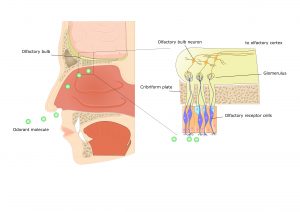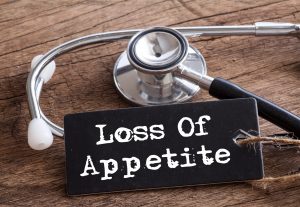 The sense of smell (olfaction) involves the detection of chemical molecules (odorants) in the air. A thin sheet of cells (olfactory epithelium) high up in the nasal cavity contains specialised nerve cells (olfactory receptor neurons) which detect and respond to the odorants. These neurons have axons which pass through tiny holes in the skull (called the cribriform plate) to the olfactory bulb, part of the olfactory (first cranial) nerve which sends smell signals to the brain.
The sense of smell (olfaction) involves the detection of chemical molecules (odorants) in the air. A thin sheet of cells (olfactory epithelium) high up in the nasal cavity contains specialised nerve cells (olfactory receptor neurons) which detect and respond to the odorants. These neurons have axons which pass through tiny holes in the skull (called the cribriform plate) to the olfactory bulb, part of the olfactory (first cranial) nerve which sends smell signals to the brain.
Taste sensation (gustation) works in a similar way. Taste receptors are found in taste buds mainly in the tongue with some in the roof of the mouth. These detect chemical molecules (tastants) in the mouth and send signals to the brain via three different cranial nerves.
Loss of the sense of smell or anosmia is a common complication of traumatic brain injury. Altered sense of smell can also occur in other types of ABI. Unless there is damage to the mouth direct loss of taste is rare but as smell is estimated to be responsible for about 80% of taste (if one’s nose is blocked with a cold, food tastes bland) anosmia impairs taste.
———————————————————————————————————
ANOSMIA
The axons of olfactory receptor neurons passing through the cribriform plate can be damaged by shearing forces in acceleration-deceleration traumatic brain injuries resulting in loss of the sense of smell. The olfactory nerve lies along the lower surface of the frontal lobe and may be damaged by haematomas or oedema of that part of the brain also causing anosmia.
Smell provides warning of the dangers of smoke, gas leaks, rotten food etc; the pleasures from fragrances of flowers and perfume and the aromas of food; as well as playing a role in sexual interactions. Thus anosmia can result in:
• Failure to recognise smoke or gas leaks, or spoiled foodstuff.
• Changes to eating habits: often loss of appetite but sometimes leads to overeating.
• Loss of the pleasure of scents and fragrances and in interpersonal and sexual relations contributing to depression and social difficulties.
It is important to fix smoke alarms and obtain the advice of a dietician for patients with anosmia.
There is generally a poor prospect of recovery from anosmia although some do improve possibly due to regeneration of olfactory neurons or resolution of oedema affecting the olfactory nerve. In some cases loss of smell is partial (=hyposmia) or smells are distorted (= parosmia) and the sense of smell may improve over time.